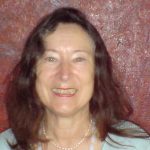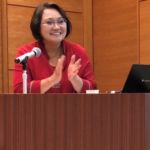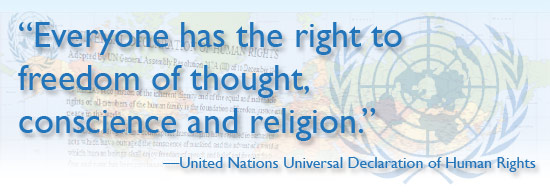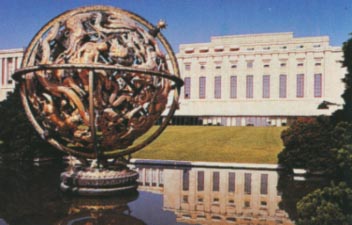International Engagement
The IARF is committed to representing the voice of free and liberal religious communities at various international forums. With general consultative status at the United Nations (ECOSOC), we collaborate with partners and umbrella organizations to advocate for religious freedom and human rights, guided by the values of liberal religion and humanism.
What We Stand For
IARF represents free and liberal religious communities and their allies, working for freedom of religion and belief, as well as freedom within religion. We are guided by our shared belief in the dignity of every human being.
Advocating Against Abuses of Religious Freedom
We firmly oppose practices that compromise human rights, even when they are justified on religious grounds. This includes:
- Challenging blasphemy laws that restrict freedom of expression
- Defending every human being's right to bodily integrity and autonomy
- Combating violence and discrimination against any group or minority
- Opposing the caste system as a form of religiously and culturally motivated discrimination
- Condemning female genital mutilation
- Opposing the penalization of homosexuality, pre- and extramarital relationships
Advocating For Religious Freedom
We actively work to protect and promote religious freedom in all its forms:
- Protecting the rights of religious minorities
- Promoting interfaith dialogue and understanding
- Supporting the right to change one's religion or belief
- Advocating for the separation of religion and state
- Defending the right to non-belief or atheism
Our approach is nuanced and thoughtful. We recognize the complexities involved in balancing different rights and freedoms. This requires careful consideration in each individual case.
Our Team
Representatives to the United Nations

Rev. Dr. Esther Suter
Main Representative
Rev. Dr. Esther Suter is an ordained minister in the Swiss Evangelical Church with extensive experience in international relations and human rights advocacy. She has worked as a pastor in congregations, as a chaplain in a university hospital, and as a volunteer pastor in a poor area of Manhattan. Her diverse experiences include implementing projects for street children in Santiago de Chile during the military dictatorship and working on partnership projects with Presbyterian churches in South Korea.
As a freelance journalist since 1990, she has worked for various ecumenical world organizations, covering international conferences including the handover of Hong Kong to China in 1997. She has participated in UN world conferences on women in Nairobi (1985) and Beijing (1995), and has been a delegate to the annual sessions of the UN Commission on the Status of Women in New York since 2010. Dr. Suter serves as an NGO Human Rights representative at the UN in both New York and Geneva for IARF and is also a representative for the International Alliance of Women at the UN in Geneva.

Prof. Kathy Ramos Matsui
Representative to New York
Prof. Kathy Ramos Matsui, Ph.D., is a professor at the Department of Global Citizenship Studies at Seisen University in Tokyo, Japan. She specializes in conflict resolution and peace-related subjects, bringing a wealth of academic knowledge to her role as IARF representative.
Prof. Matsui works closely with peace researchers and educators internationally through the International Institute on Peace Education and Global Partnership for Prevention of Armed Conflict. Her recent focus has been on the Northeast Asia Regional Peacebuilding Institute (NARPI), an annual event training participants from Northeast Asia in peace education activities.
In addition to her academic work, Prof. Matsui is actively involved in inter-religious dialogue and cooperation for world peace. She serves on the Women's Executive Committee, Peace Research Institute, and the Reconciliation Education Task Force of the World Conference of Religions for Peace (WCRP). She also holds the position of IALRW Japan Chairperson and is a member of the IARF Japan Chapter.
International Collaboration Working Group
Our International Collaboration Working Group is the backbone of our representation and advocacy work. This group coordinates our efforts across major international bodies, including the UN in Geneva and New York, the Council of Europe, and the European Parliament. We focus on building and maintaining robust relationships with various umbrella and network organizations of NGOs, as well as networks of liberal religious groups.
The group's activities include preparing statements, coordinating advocacy efforts, and participating in key meetings and conferences that align with our mission. Recently, we've been engaging in nuanced discussions on complex issues such as ritual slaughter, carefully balancing religious freedom with animal welfare concerns. This process involves studying the stances of our members and other liberal religious communities, examining the latest scientific findings, and thoughtfully considering how to balance competing rights and principles.
We welcome members who are passionate about human rights, religious freedom, and international advocacy to join this vital group. Together, we can make a significant impact in upholding the dignity and freedom of individuals across the globe, regardless of their religious or belief system.
History
The International Association for Religious Freedom has a long and rich history of involvement with the United Nations, dating back to the early days of the UN itself.
1955
Early Recognition
IARF (under a former name) is mentioned as one of fewer than 300 non-governmental organizations registered with the UN's Economic and Social Council (ECOSOC) in the 1955 UN Yearbook. This early recognition highlights our long-standing commitment to international cooperation and human rights advocacy.
1972
Consultative Status
IARF applied for and was granted consultative status with ECOSOC. This status allowed us to participate more fully in UN processes and advocate more effectively for religious freedom on the international stage.
1989
NGO Committee on Freedom of Religion or Belief
IARF played a key role in initiating the NGO Committee on Freedom of Religion or Belief. This committee, spearheaded by Homer Jack, became a crucial platform for NGOs to collaborate on issues of religious freedom and to support the work of the UN Special Rapporteur on Religious Intolerance (later renamed to Special Rapporteur on Freedom of Religion or Belief).
1995-Present
Annual Day for Freedom of Religion or Belief
IARF has been actively involved in the commemoration of the UN's Annual Day for Freedom of Religion or Belief since its inception in 1995. This day honors the anniversary of the UN General Assembly's "Declaration on the Elimination of All Forms of Intolerance and Discrimination Based on Religion or Belief" adopted on November 25, 1981.
Over the years, IARF has contributed to these commemorations, which have featured speakers such as UN High Commissioner for Human Rights Mary Robinson, Special Rapporteur on Freedom of Religion or Belief Professor Abdelfattah Amor, and prominent scholars and activists in the field of religious freedom.
Ongoing Commitment
Throughout our history, IARF representatives have served in various major roles with the NGO Committee on Freedom of Religion or Belief (CoFRoB), including as its first President. We continue to be actively involved in UN processes and working collaboratively with other NGOs to support religious freedom worldwide.
Support Us
Your involvement is crucial to our mission of promoting religious freedom and human rights worldwide. Here's how you can help:
Raise Issues
We value your insights and experiences. If you know of religious freedom issues that need attention on the international stage, please inform us. Your input helps us address the most pressing concerns in our work with the UN and other international bodies.
Join Our Working Group
Consider becoming a volunteer in our International Collaboration Working Group. We need passionate individuals who can contribute their expertise in human rights, religious studies, international relations, or related fields. Your involvement can help shape our advocacy efforts and strengthen our impact.
Donate
Financial support is vital for sustaining our work. Your donations help us maintain our presence at international forums, conduct research, and advocate effectively for religious freedom. Every contribution, no matter the size, makes a difference.
Donate NowTogether, we can work towards a world where everyone's right to freedom of religion or belief is respected and protected. Your support empowers us to continue our important work in international forums, giving voice to those who might otherwise go unheard. Thank you for considering how you can contribute to this crucial mission.
IARF at the United Nations

The members of the IARF family fully support the principles laid out in the U.N.’s 1981 Declaration on the Elimination of All Forms of Intolerance and Discrimination Based on Religion or Belief (DEIDRB) which advocates “freedom of thought, conscience, religion and belief“.
Within the framework of these rights, the Declaration also encourages responsible religious practice — a cornerstone of IARF’s work.
IARF is one of 139 organisations in General Consultative status with the Economic & Social Council (ECOSOC) of the United Nations. This status entitles IARF representatives at the U.N. in Geneva to regularly make interventions on behalf of religious minorities.
IARF also has representatives in New York who work with other non-governmental organisations in support of religious freedom.
Our Human Rights Advocacy Strategy
Our work at the UN is based on partnership & collaboration with the wider network reach of our membership, and acting on information received from them. This enables us to offer some voice for the unheard, by taking their issues to the relevant UN human rights mechanisms – the Human Rights Council, Special Procedures, the Universal Periodic Review, and the Treaty Bodies.
IARF at the United Nations: A Brief History
The International Association for Religious Freedom has a long history of involvement with the United Nations. The organisation is first mentioned (under a former name) as one of fewer than 300 non-governmental organisations registered with the U.N.’s Economic and Social Council (ECOSOC) in the 1955 UN Yearbook. In 1972, IARF applied for & was granted consultative status with ECOSOC.

The organisation was instrumental to the development of an NGO Committee on Freedom of Religion or Belief, which was initiated by Homer Jack in 1989. The IARF, joined by the World Conference on Religion and Peace and the International Religious Liberty Association funded a study entitled “The Question of a United Nations Convention on Religious Intolerance.” The study, based on interviews with UN staff, diplomats and NGOs, was inconclusive on the advisability of working specifically to get the UN to adopt a convention as such, but those interviewed for the study indicated strongly that the issue of religious intolerance was an important one which should receive serious attention.
Following publication of the study, a group of NGOs met regularly to follow the issue and to provide support for the Special Rapporteur on Religious Intolerance (this title was later changed by the Commission on Human Rights). The Special Rapporteur was initially appointed in 1986 to report regularly to the UN Commission on Human Rights and the General Assembly about violations of religious freedom.
In 1992, the NGO Committee on Freedom of Religion or Belief (CoFRoB) applied for and was granted formal status with ECOSOC as one of about 20 NGO Committees associated with ECOSOC’s Council of NGOs. IARF Representatives to the UN have served in various major roles with CoFRoB. Homer Jack provided inspiration and energy, especially in the early days of CoFRoB. Sue Nichols was CoFRoB’s first President, and has since also served as CoFRoB’s Secretary and Treasurer.
The IARF has been involved in commemoration of the UN’s Annual Day for Freedom of Religion or Belief, which has been observed each year since 1995 to honor the anniversary of the General Assembly’s “Declaration on the Elimination of All Forms of Intolerance and Discrimination Based on Religion or Belief.” The Declaration, adopted by the UN General Assembly on November 25, 1981, expands on Article 18 of the Universal Declaration of Human Rights, which guarantees universal freedom of religion or belief. Major speakers among many NGOs, religious leaders, activists and scholars have included:
- the UN High Commissioner for Human Rights, Mary Robinson;
- the Special Rapporteur on Freedom of Religion or Belief (April 1993 – July 2004), Professor Abdelfattah Amor;
- author of The Clash of Civilizations and the Remaking of World Order, Samuel Huntington;
- members of USCIRF (the U.S. Commission on International Religious Freedom) Felice Gaer and David Saperstein.